Subject 6 Observation Form: Early Childhood Education Skills Workbook
VerifiedAdded on 2023/06/10
|11
|2386
|75
Practical Assignment
AI Summary
This document presents a completed third-party observation form for Subject 6 of the CHC50113 Diploma of Early Childhood Education and Care Skills Workbook. The form assesses a childcare educator's ability to demonstrate culturally appropriate practices, foster a psychologically safe environment, and effectively communicate with diverse families and colleagues. The candidate provides detailed descriptions and examples related to respecting cultural diversity, resolving conflicts, and promoting cultural safety within the workplace. The supervisor's section includes observations and comments on the candidate's performance, confirming the candidate's ability to meet the requirements of the subject. The document covers various aspects, including communication strategies, conflict resolution, self and social awareness, support for cultural participation, and the integration of cultural safety in the workplace. The observation form is a comprehensive assessment tool, providing evidence of the candidate's competence in various areas. The supervisor's feedback validates the candidate's demonstration of the required skills and knowledge within a childcare setting.
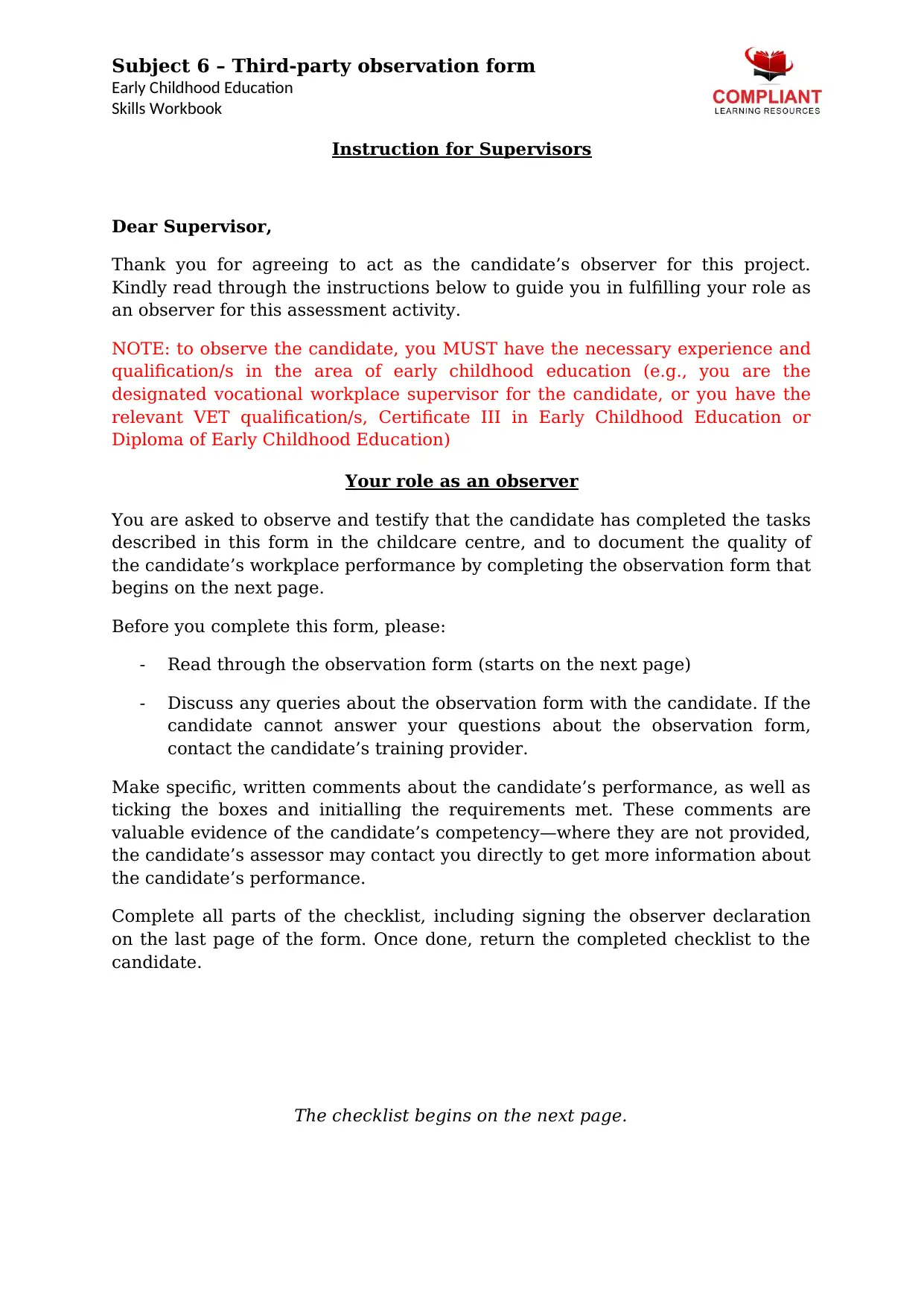
Subject 6 – Third-party observation form
Early Childhood Education
Skills Workbook
Instruction for Supervisors
Dear Supervisor,
Thank you for agreeing to act as the candidate’s observer for this project.
Kindly read through the instructions below to guide you in fulfilling your role as
an observer for this assessment activity.
NOTE: to observe the candidate, you MUST have the necessary experience and
qualification/s in the area of early childhood education (e.g., you are the
designated vocational workplace supervisor for the candidate, or you have the
relevant VET qualification/s, Certificate III in Early Childhood Education or
Diploma of Early Childhood Education)
Your role as an observer
You are asked to observe and testify that the candidate has completed the tasks
described in this form in the childcare centre, and to document the quality of
the candidate’s workplace performance by completing the observation form that
begins on the next page.
Before you complete this form, please:
- Read through the observation form (starts on the next page)
- Discuss any queries about the observation form with the candidate. If the
candidate cannot answer your questions about the observation form,
contact the candidate’s training provider.
Make specific, written comments about the candidate’s performance, as well as
ticking the boxes and initialling the requirements met. These comments are
valuable evidence of the candidate’s competency—where they are not provided,
the candidate’s assessor may contact you directly to get more information about
the candidate’s performance.
Complete all parts of the checklist, including signing the observer declaration
on the last page of the form. Once done, return the completed checklist to the
candidate.
The checklist begins on the next page.
Early Childhood Education
Skills Workbook
Instruction for Supervisors
Dear Supervisor,
Thank you for agreeing to act as the candidate’s observer for this project.
Kindly read through the instructions below to guide you in fulfilling your role as
an observer for this assessment activity.
NOTE: to observe the candidate, you MUST have the necessary experience and
qualification/s in the area of early childhood education (e.g., you are the
designated vocational workplace supervisor for the candidate, or you have the
relevant VET qualification/s, Certificate III in Early Childhood Education or
Diploma of Early Childhood Education)
Your role as an observer
You are asked to observe and testify that the candidate has completed the tasks
described in this form in the childcare centre, and to document the quality of
the candidate’s workplace performance by completing the observation form that
begins on the next page.
Before you complete this form, please:
- Read through the observation form (starts on the next page)
- Discuss any queries about the observation form with the candidate. If the
candidate cannot answer your questions about the observation form,
contact the candidate’s training provider.
Make specific, written comments about the candidate’s performance, as well as
ticking the boxes and initialling the requirements met. These comments are
valuable evidence of the candidate’s competency—where they are not provided,
the candidate’s assessor may contact you directly to get more information about
the candidate’s performance.
Complete all parts of the checklist, including signing the observer declaration
on the last page of the form. Once done, return the completed checklist to the
candidate.
The checklist begins on the next page.
Paraphrase This Document
Need a fresh take? Get an instant paraphrase of this document with our AI Paraphraser
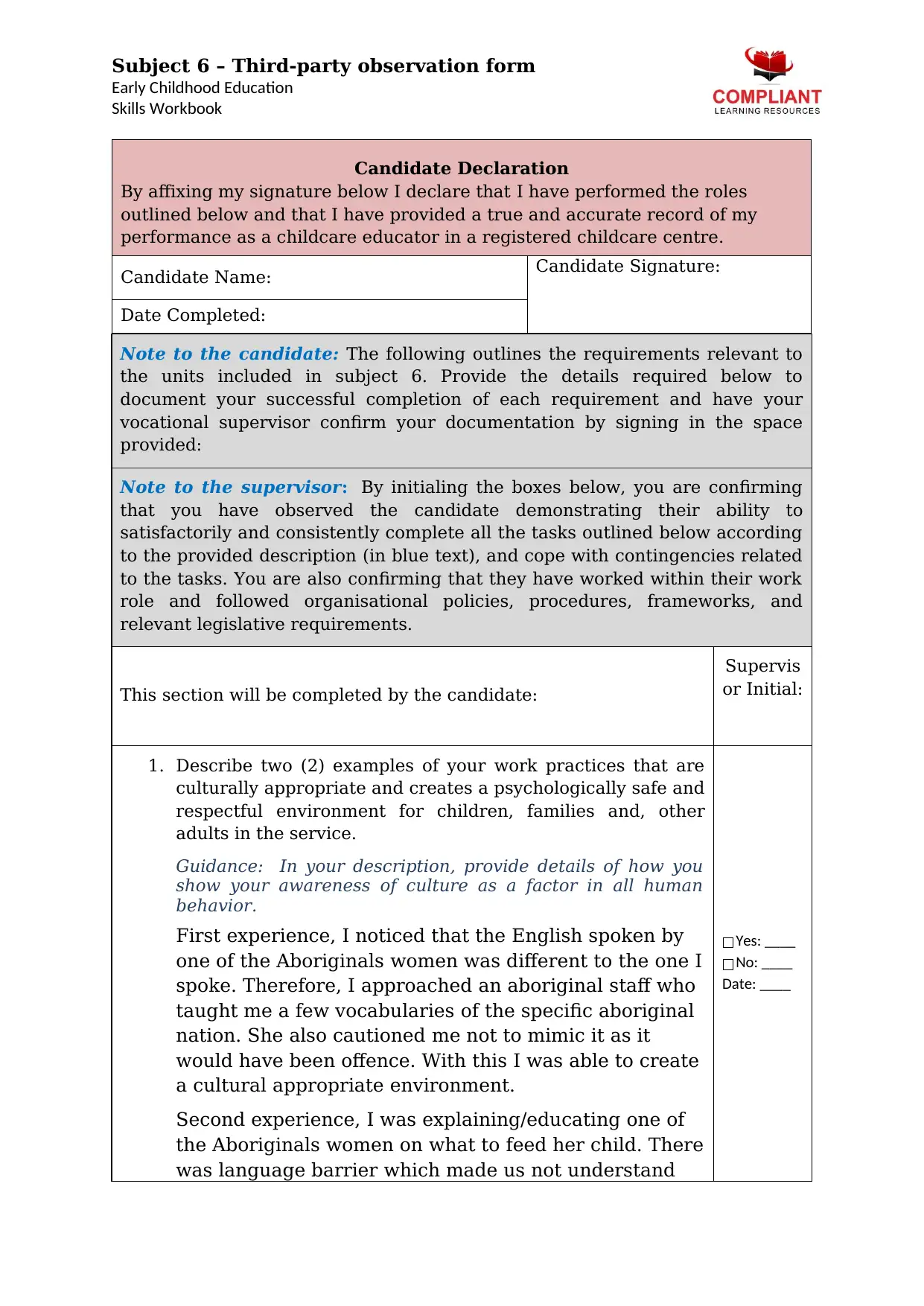
Subject 6 – Third-party observation form
Early Childhood Education
Skills Workbook
Candidate Declaration
By affixing my signature below I declare that I have performed the roles
outlined below and that I have provided a true and accurate record of my
performance as a childcare educator in a registered childcare centre.
Candidate Name: Candidate Signature:
Date Completed:
Note to the candidate: The following outlines the requirements relevant to
the units included in subject 6. Provide the details required below to
document your successful completion of each requirement and have your
vocational supervisor confirm your documentation by signing in the space
provided:
Note to the supervisor: By initialing the boxes below, you are confirming
that you have observed the candidate demonstrating their ability to
satisfactorily and consistently complete all the tasks outlined below according
to the provided description (in blue text), and cope with contingencies related
to the tasks. You are also confirming that they have worked within their work
role and followed organisational policies, procedures, frameworks, and
relevant legislative requirements.
This section will be completed by the candidate:
Supervis
or Initial:
1. Describe two (2) examples of your work practices that are
culturally appropriate and creates a psychologically safe and
respectful environment for children, families and, other
adults in the service.
Guidance: In your description, provide details of how you
show your awareness of culture as a factor in all human
behavior.
First experience, I noticed that the English spoken by
one of the Aboriginals women was different to the one I
spoke. Therefore, I approached an aboriginal staff who
taught me a few vocabularies of the specific aboriginal
nation. She also cautioned me not to mimic it as it
would have been offence. With this I was able to create
a cultural appropriate environment.
Second experience, I was explaining/educating one of
the Aboriginals women on what to feed her child. There
was language barrier which made us not understand
Yes: ____
No: ____
Date: ____
Early Childhood Education
Skills Workbook
Candidate Declaration
By affixing my signature below I declare that I have performed the roles
outlined below and that I have provided a true and accurate record of my
performance as a childcare educator in a registered childcare centre.
Candidate Name: Candidate Signature:
Date Completed:
Note to the candidate: The following outlines the requirements relevant to
the units included in subject 6. Provide the details required below to
document your successful completion of each requirement and have your
vocational supervisor confirm your documentation by signing in the space
provided:
Note to the supervisor: By initialing the boxes below, you are confirming
that you have observed the candidate demonstrating their ability to
satisfactorily and consistently complete all the tasks outlined below according
to the provided description (in blue text), and cope with contingencies related
to the tasks. You are also confirming that they have worked within their work
role and followed organisational policies, procedures, frameworks, and
relevant legislative requirements.
This section will be completed by the candidate:
Supervis
or Initial:
1. Describe two (2) examples of your work practices that are
culturally appropriate and creates a psychologically safe and
respectful environment for children, families and, other
adults in the service.
Guidance: In your description, provide details of how you
show your awareness of culture as a factor in all human
behavior.
First experience, I noticed that the English spoken by
one of the Aboriginals women was different to the one I
spoke. Therefore, I approached an aboriginal staff who
taught me a few vocabularies of the specific aboriginal
nation. She also cautioned me not to mimic it as it
would have been offence. With this I was able to create
a cultural appropriate environment.
Second experience, I was explaining/educating one of
the Aboriginals women on what to feed her child. There
was language barrier which made us not understand
Yes: ____
No: ____
Date: ____
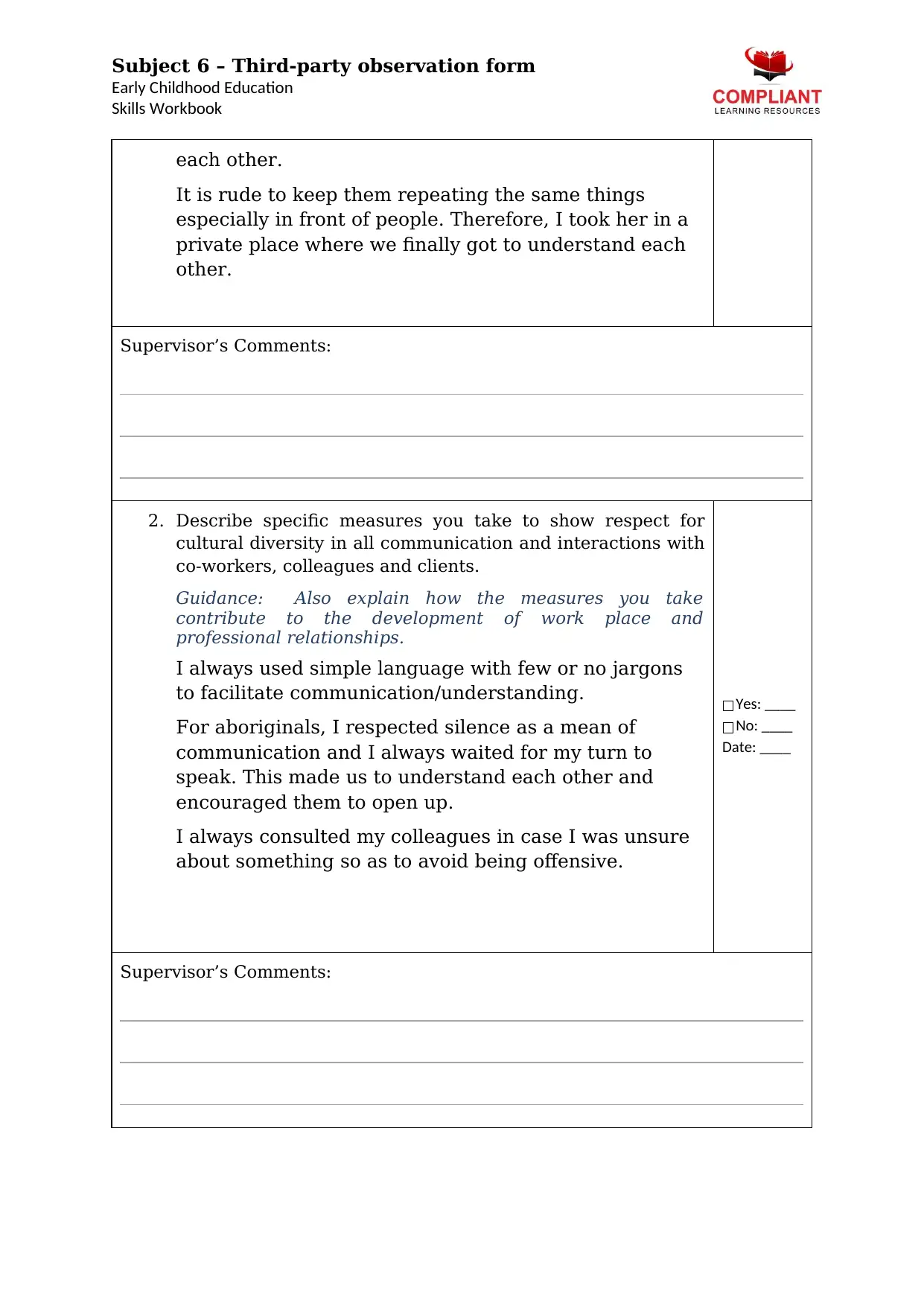
Subject 6 – Third-party observation form
Early Childhood Education
Skills Workbook
each other.
It is rude to keep them repeating the same things
especially in front of people. Therefore, I took her in a
private place where we finally got to understand each
other.
Supervisor’s Comments:
2. Describe specific measures you take to show respect for
cultural diversity in all communication and interactions with
co-workers, colleagues and clients.
Guidance: Also explain how the measures you take
contribute to the development of work place and
professional relationships.
I always used simple language with few or no jargons
to facilitate communication/understanding.
For aboriginals, I respected silence as a mean of
communication and I always waited for my turn to
speak. This made us to understand each other and
encouraged them to open up.
I always consulted my colleagues in case I was unsure
about something so as to avoid being offensive.
Yes: ____
No: ____
Date: ____
Supervisor’s Comments:
Early Childhood Education
Skills Workbook
each other.
It is rude to keep them repeating the same things
especially in front of people. Therefore, I took her in a
private place where we finally got to understand each
other.
Supervisor’s Comments:
2. Describe specific measures you take to show respect for
cultural diversity in all communication and interactions with
co-workers, colleagues and clients.
Guidance: Also explain how the measures you take
contribute to the development of work place and
professional relationships.
I always used simple language with few or no jargons
to facilitate communication/understanding.
For aboriginals, I respected silence as a mean of
communication and I always waited for my turn to
speak. This made us to understand each other and
encouraged them to open up.
I always consulted my colleagues in case I was unsure
about something so as to avoid being offensive.
Yes: ____
No: ____
Date: ____
Supervisor’s Comments:
⊘ This is a preview!⊘
Do you want full access?
Subscribe today to unlock all pages.

Trusted by 1+ million students worldwide
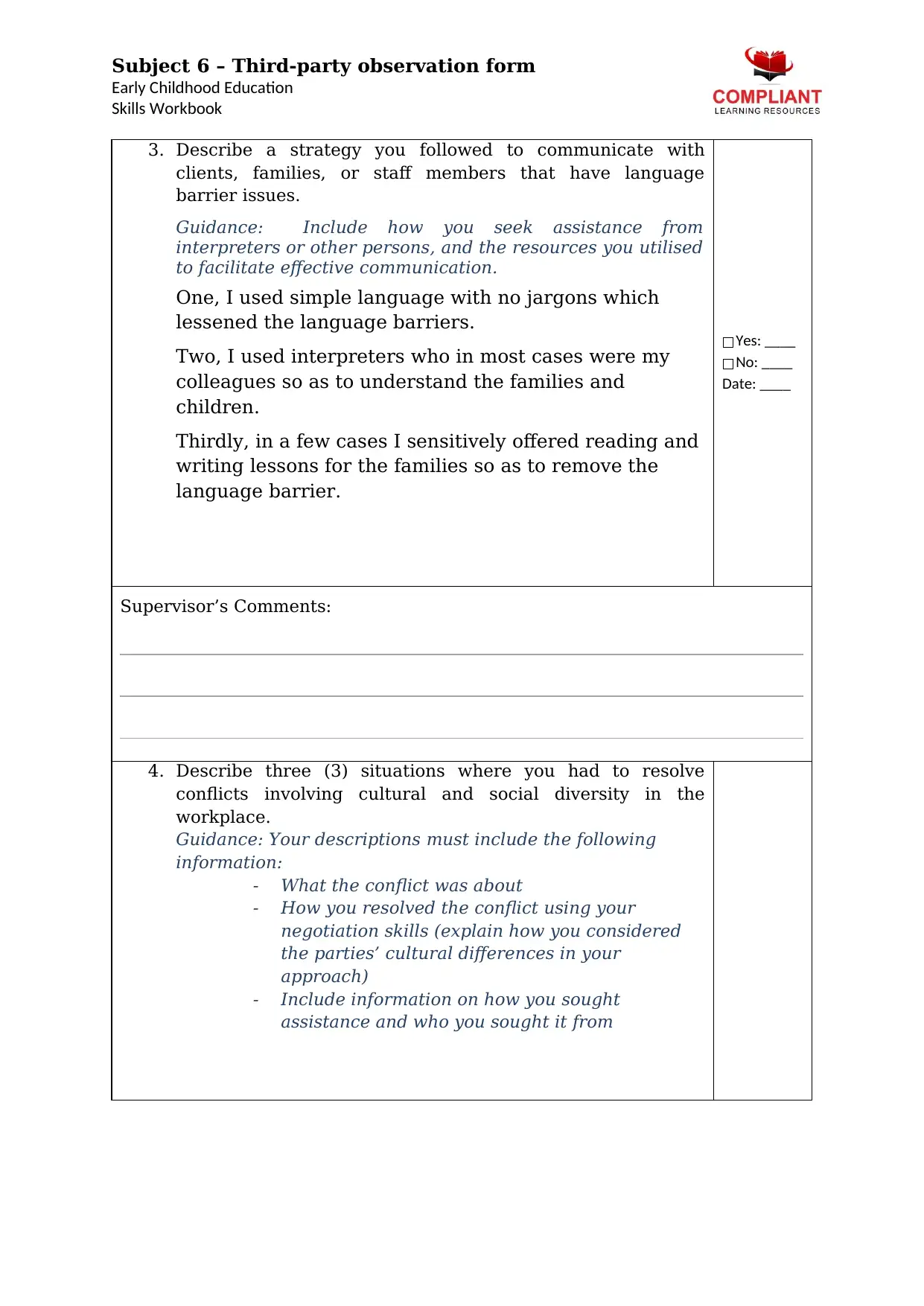
Subject 6 – Third-party observation form
Early Childhood Education
Skills Workbook
3. Describe a strategy you followed to communicate with
clients, families, or staff members that have language
barrier issues.
Guidance: Include how you seek assistance from
interpreters or other persons, and the resources you utilised
to facilitate effective communication.
One, I used simple language with no jargons which
lessened the language barriers.
Two, I used interpreters who in most cases were my
colleagues so as to understand the families and
children.
Thirdly, in a few cases I sensitively offered reading and
writing lessons for the families so as to remove the
language barrier.
Yes: ____
No: ____
Date: ____
Supervisor’s Comments:
4. Describe three (3) situations where you had to resolve
conflicts involving cultural and social diversity in the
workplace.
Guidance: Your descriptions must include the following
information:
- What the conflict was about
- How you resolved the conflict using your
negotiation skills (explain how you considered
the parties’ cultural differences in your
approach)
- Include information on how you sought
assistance and who you sought it from
Early Childhood Education
Skills Workbook
3. Describe a strategy you followed to communicate with
clients, families, or staff members that have language
barrier issues.
Guidance: Include how you seek assistance from
interpreters or other persons, and the resources you utilised
to facilitate effective communication.
One, I used simple language with no jargons which
lessened the language barriers.
Two, I used interpreters who in most cases were my
colleagues so as to understand the families and
children.
Thirdly, in a few cases I sensitively offered reading and
writing lessons for the families so as to remove the
language barrier.
Yes: ____
No: ____
Date: ____
Supervisor’s Comments:
4. Describe three (3) situations where you had to resolve
conflicts involving cultural and social diversity in the
workplace.
Guidance: Your descriptions must include the following
information:
- What the conflict was about
- How you resolved the conflict using your
negotiation skills (explain how you considered
the parties’ cultural differences in your
approach)
- Include information on how you sought
assistance and who you sought it from
Paraphrase This Document
Need a fresh take? Get an instant paraphrase of this document with our AI Paraphraser
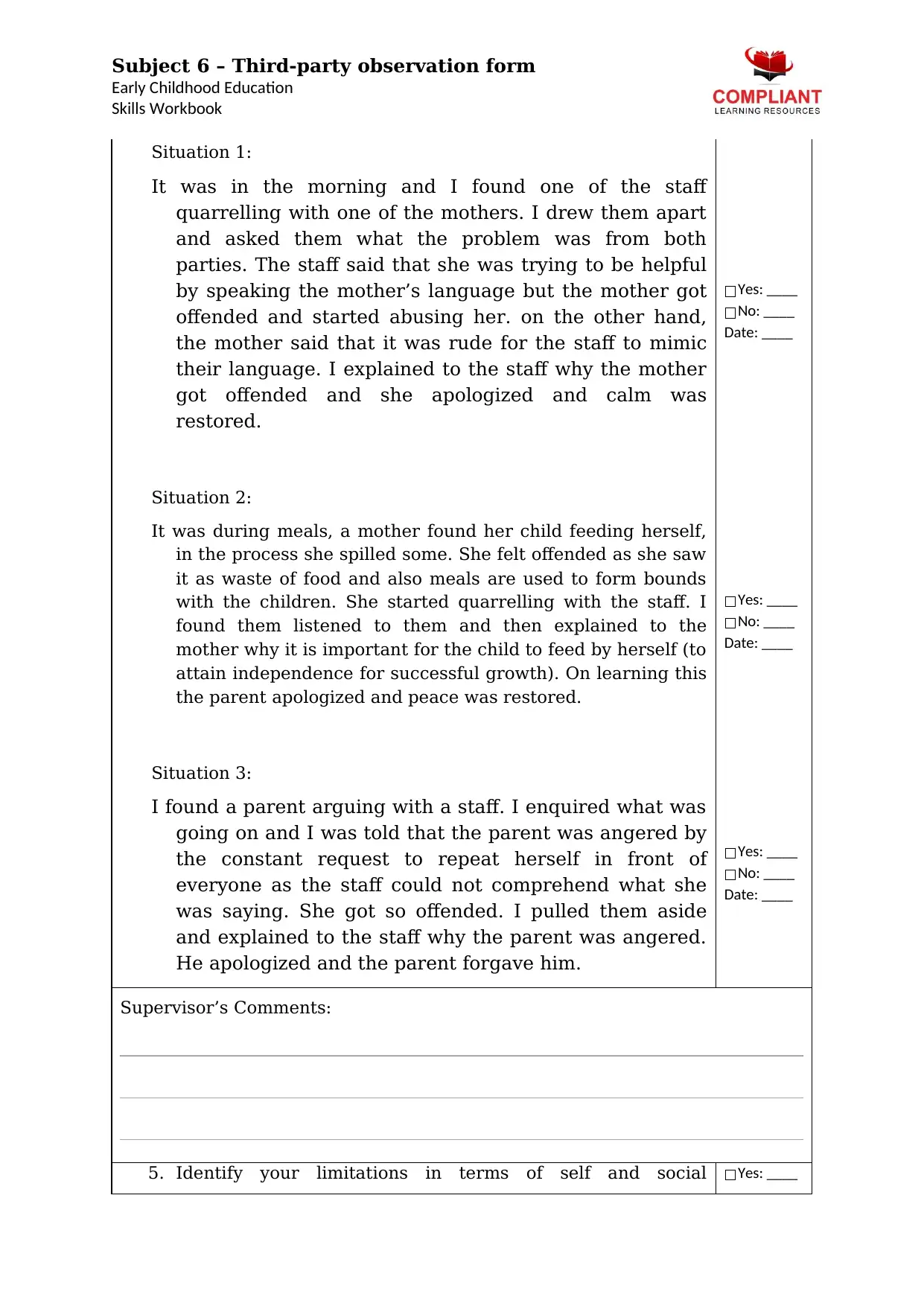
Subject 6 – Third-party observation form
Early Childhood Education
Skills Workbook
Situation 1:
It was in the morning and I found one of the staff
quarrelling with one of the mothers. I drew them apart
and asked them what the problem was from both
parties. The staff said that she was trying to be helpful
by speaking the mother’s language but the mother got
offended and started abusing her. on the other hand,
the mother said that it was rude for the staff to mimic
their language. I explained to the staff why the mother
got offended and she apologized and calm was
restored.
Yes: ____
No: ____
Date: ____
Situation 2:
It was during meals, a mother found her child feeding herself,
in the process she spilled some. She felt offended as she saw
it as waste of food and also meals are used to form bounds
with the children. She started quarrelling with the staff. I
found them listened to them and then explained to the
mother why it is important for the child to feed by herself (to
attain independence for successful growth). On learning this
the parent apologized and peace was restored.
Yes: ____
No: ____
Date: ____
Situation 3:
I found a parent arguing with a staff. I enquired what was
going on and I was told that the parent was angered by
the constant request to repeat herself in front of
everyone as the staff could not comprehend what she
was saying. She got so offended. I pulled them aside
and explained to the staff why the parent was angered.
He apologized and the parent forgave him.
Yes: ____
No: ____
Date: ____
Supervisor’s Comments:
5. Identify your limitations in terms of self and social Yes: ____
Early Childhood Education
Skills Workbook
Situation 1:
It was in the morning and I found one of the staff
quarrelling with one of the mothers. I drew them apart
and asked them what the problem was from both
parties. The staff said that she was trying to be helpful
by speaking the mother’s language but the mother got
offended and started abusing her. on the other hand,
the mother said that it was rude for the staff to mimic
their language. I explained to the staff why the mother
got offended and she apologized and calm was
restored.
Yes: ____
No: ____
Date: ____
Situation 2:
It was during meals, a mother found her child feeding herself,
in the process she spilled some. She felt offended as she saw
it as waste of food and also meals are used to form bounds
with the children. She started quarrelling with the staff. I
found them listened to them and then explained to the
mother why it is important for the child to feed by herself (to
attain independence for successful growth). On learning this
the parent apologized and peace was restored.
Yes: ____
No: ____
Date: ____
Situation 3:
I found a parent arguing with a staff. I enquired what was
going on and I was told that the parent was angered by
the constant request to repeat herself in front of
everyone as the staff could not comprehend what she
was saying. She got so offended. I pulled them aside
and explained to the staff why the parent was angered.
He apologized and the parent forgave him.
Yes: ____
No: ____
Date: ____
Supervisor’s Comments:
5. Identify your limitations in terms of self and social Yes: ____
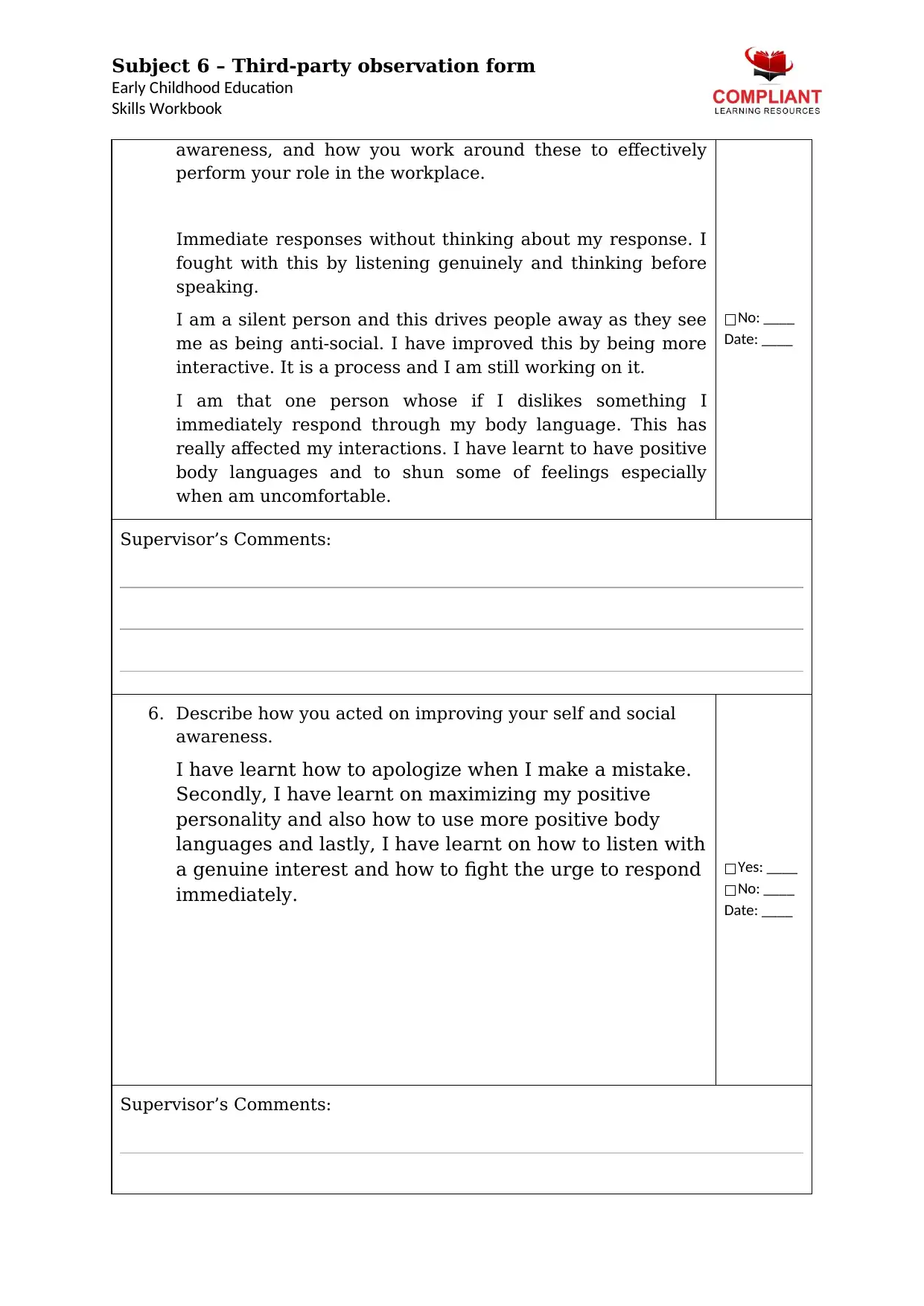
Subject 6 – Third-party observation form
Early Childhood Education
Skills Workbook
awareness, and how you work around these to effectively
perform your role in the workplace.
Immediate responses without thinking about my response. I
fought with this by listening genuinely and thinking before
speaking.
I am a silent person and this drives people away as they see
me as being anti-social. I have improved this by being more
interactive. It is a process and I am still working on it.
I am that one person whose if I dislikes something I
immediately respond through my body language. This has
really affected my interactions. I have learnt to have positive
body languages and to shun some of feelings especially
when am uncomfortable.
No: ____
Date: ____
Supervisor’s Comments:
6. Describe how you acted on improving your self and social
awareness.
I have learnt how to apologize when I make a mistake.
Secondly, I have learnt on maximizing my positive
personality and also how to use more positive body
languages and lastly, I have learnt on how to listen with
a genuine interest and how to fight the urge to respond
immediately.
Yes: ____
No: ____
Date: ____
Supervisor’s Comments:
Early Childhood Education
Skills Workbook
awareness, and how you work around these to effectively
perform your role in the workplace.
Immediate responses without thinking about my response. I
fought with this by listening genuinely and thinking before
speaking.
I am a silent person and this drives people away as they see
me as being anti-social. I have improved this by being more
interactive. It is a process and I am still working on it.
I am that one person whose if I dislikes something I
immediately respond through my body language. This has
really affected my interactions. I have learnt to have positive
body languages and to shun some of feelings especially
when am uncomfortable.
No: ____
Date: ____
Supervisor’s Comments:
6. Describe how you acted on improving your self and social
awareness.
I have learnt how to apologize when I make a mistake.
Secondly, I have learnt on maximizing my positive
personality and also how to use more positive body
languages and lastly, I have learnt on how to listen with
a genuine interest and how to fight the urge to respond
immediately.
Yes: ____
No: ____
Date: ____
Supervisor’s Comments:
⊘ This is a preview!⊘
Do you want full access?
Subscribe today to unlock all pages.

Trusted by 1+ million students worldwide
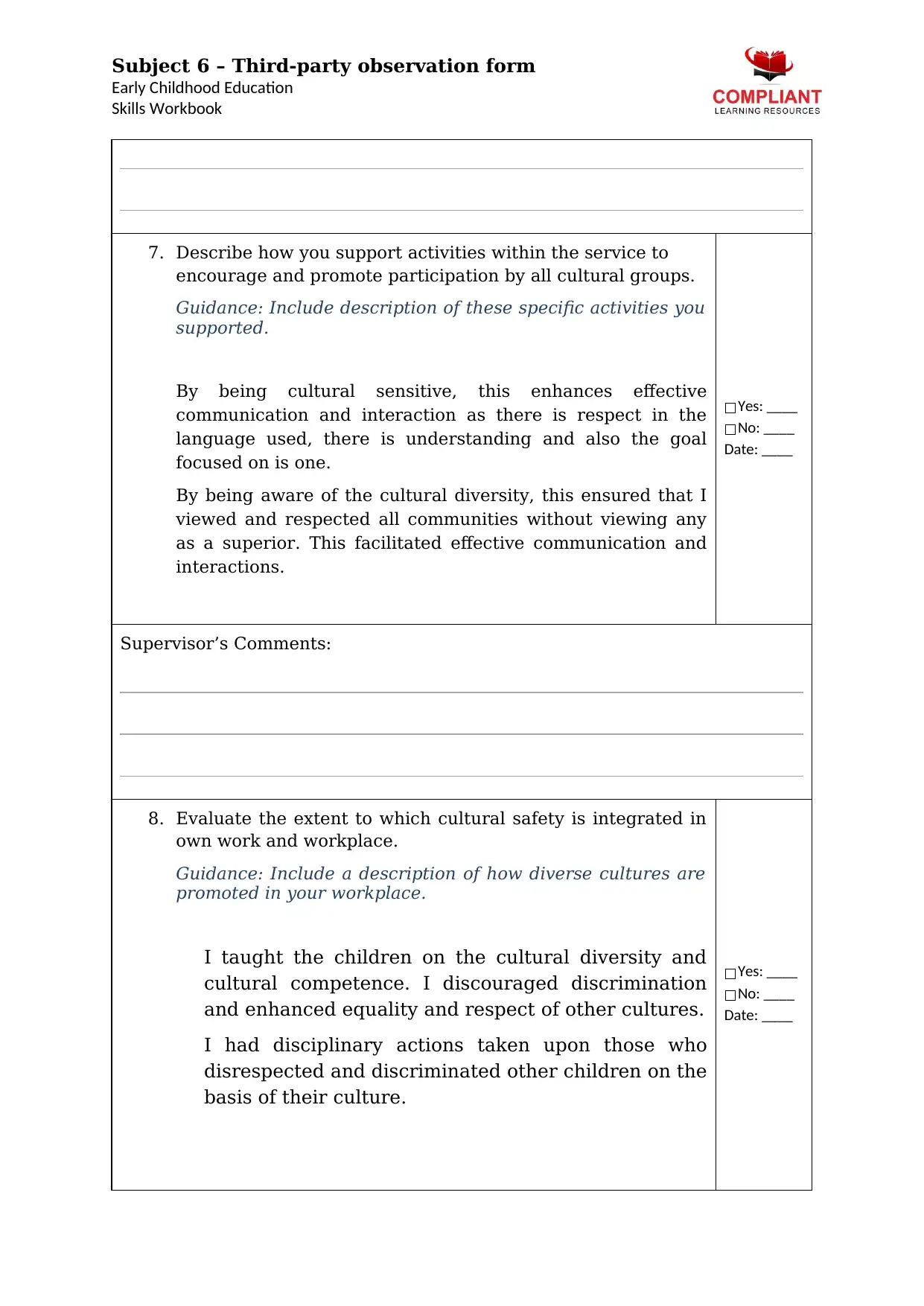
Subject 6 – Third-party observation form
Early Childhood Education
Skills Workbook
7. Describe how you support activities within the service to
encourage and promote participation by all cultural groups.
Guidance: Include description of these specific activities you
supported.
By being cultural sensitive, this enhances effective
communication and interaction as there is respect in the
language used, there is understanding and also the goal
focused on is one.
By being aware of the cultural diversity, this ensured that I
viewed and respected all communities without viewing any
as a superior. This facilitated effective communication and
interactions.
Yes: ____
No: ____
Date: ____
Supervisor’s Comments:
8. Evaluate the extent to which cultural safety is integrated in
own work and workplace.
Guidance: Include a description of how diverse cultures are
promoted in your workplace.
I taught the children on the cultural diversity and
cultural competence. I discouraged discrimination
and enhanced equality and respect of other cultures.
I had disciplinary actions taken upon those who
disrespected and discriminated other children on the
basis of their culture.
Yes: ____
No: ____
Date: ____
Early Childhood Education
Skills Workbook
7. Describe how you support activities within the service to
encourage and promote participation by all cultural groups.
Guidance: Include description of these specific activities you
supported.
By being cultural sensitive, this enhances effective
communication and interaction as there is respect in the
language used, there is understanding and also the goal
focused on is one.
By being aware of the cultural diversity, this ensured that I
viewed and respected all communities without viewing any
as a superior. This facilitated effective communication and
interactions.
Yes: ____
No: ____
Date: ____
Supervisor’s Comments:
8. Evaluate the extent to which cultural safety is integrated in
own work and workplace.
Guidance: Include a description of how diverse cultures are
promoted in your workplace.
I taught the children on the cultural diversity and
cultural competence. I discouraged discrimination
and enhanced equality and respect of other cultures.
I had disciplinary actions taken upon those who
disrespected and discriminated other children on the
basis of their culture.
Yes: ____
No: ____
Date: ____
Paraphrase This Document
Need a fresh take? Get an instant paraphrase of this document with our AI Paraphraser
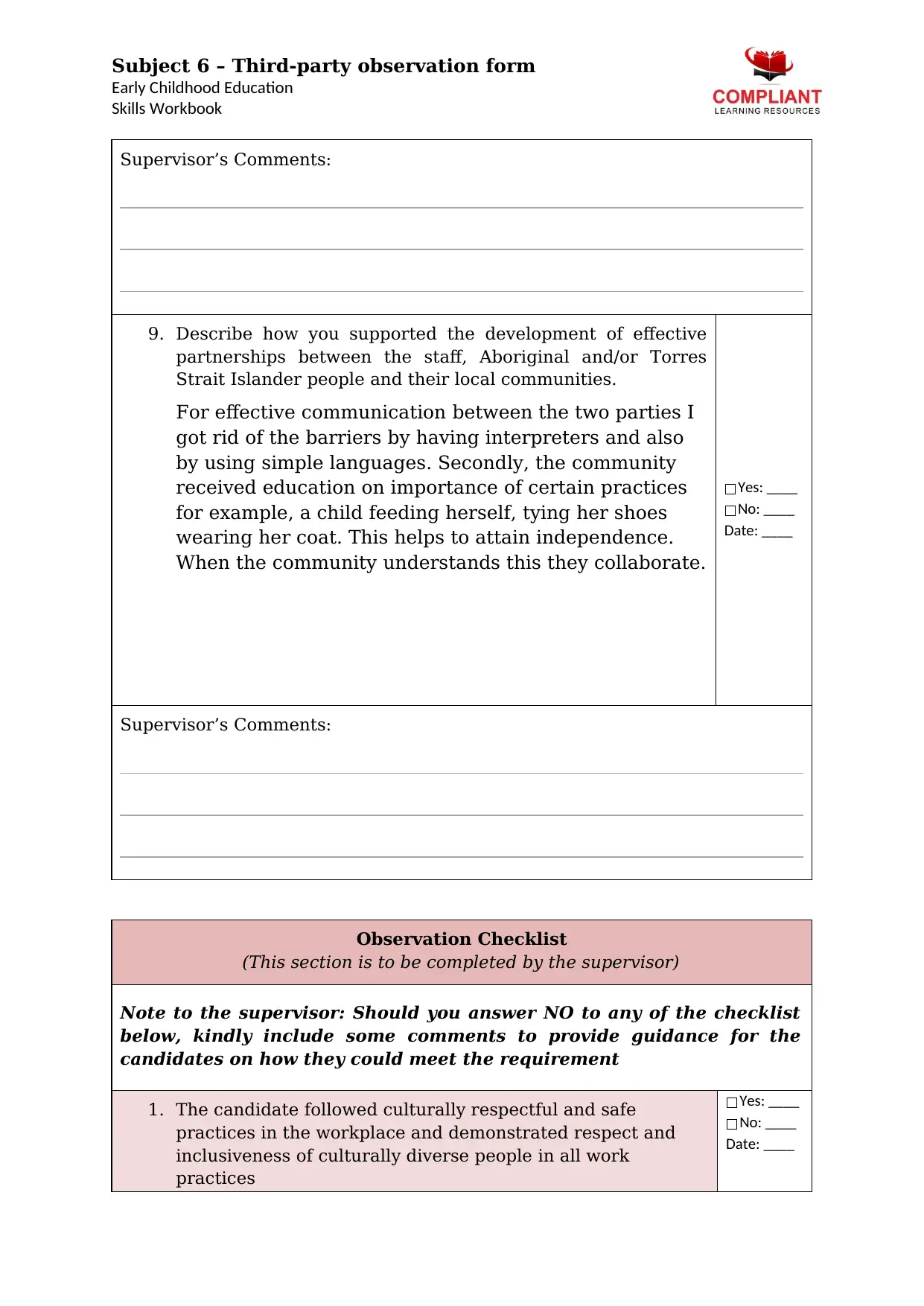
Subject 6 – Third-party observation form
Early Childhood Education
Skills Workbook
Supervisor’s Comments:
9. Describe how you supported the development of effective
partnerships between the staff, Aboriginal and/or Torres
Strait Islander people and their local communities.
For effective communication between the two parties I
got rid of the barriers by having interpreters and also
by using simple languages. Secondly, the community
received education on importance of certain practices
for example, a child feeding herself, tying her shoes
wearing her coat. This helps to attain independence.
When the community understands this they collaborate.
Yes: ____
No: ____
Date: ____
Supervisor’s Comments:
Observation Checklist
(This section is to be completed by the supervisor)
Note to the supervisor: Should you answer NO to any of the checklist
below, kindly include some comments to provide guidance for the
candidates on how they could meet the requirement
1. The candidate followed culturally respectful and safe
practices in the workplace and demonstrated respect and
inclusiveness of culturally diverse people in all work
practices
Yes: ____
No: ____
Date: ____
Early Childhood Education
Skills Workbook
Supervisor’s Comments:
9. Describe how you supported the development of effective
partnerships between the staff, Aboriginal and/or Torres
Strait Islander people and their local communities.
For effective communication between the two parties I
got rid of the barriers by having interpreters and also
by using simple languages. Secondly, the community
received education on importance of certain practices
for example, a child feeding herself, tying her shoes
wearing her coat. This helps to attain independence.
When the community understands this they collaborate.
Yes: ____
No: ____
Date: ____
Supervisor’s Comments:
Observation Checklist
(This section is to be completed by the supervisor)
Note to the supervisor: Should you answer NO to any of the checklist
below, kindly include some comments to provide guidance for the
candidates on how they could meet the requirement
1. The candidate followed culturally respectful and safe
practices in the workplace and demonstrated respect and
inclusiveness of culturally diverse people in all work
practices
Yes: ____
No: ____
Date: ____
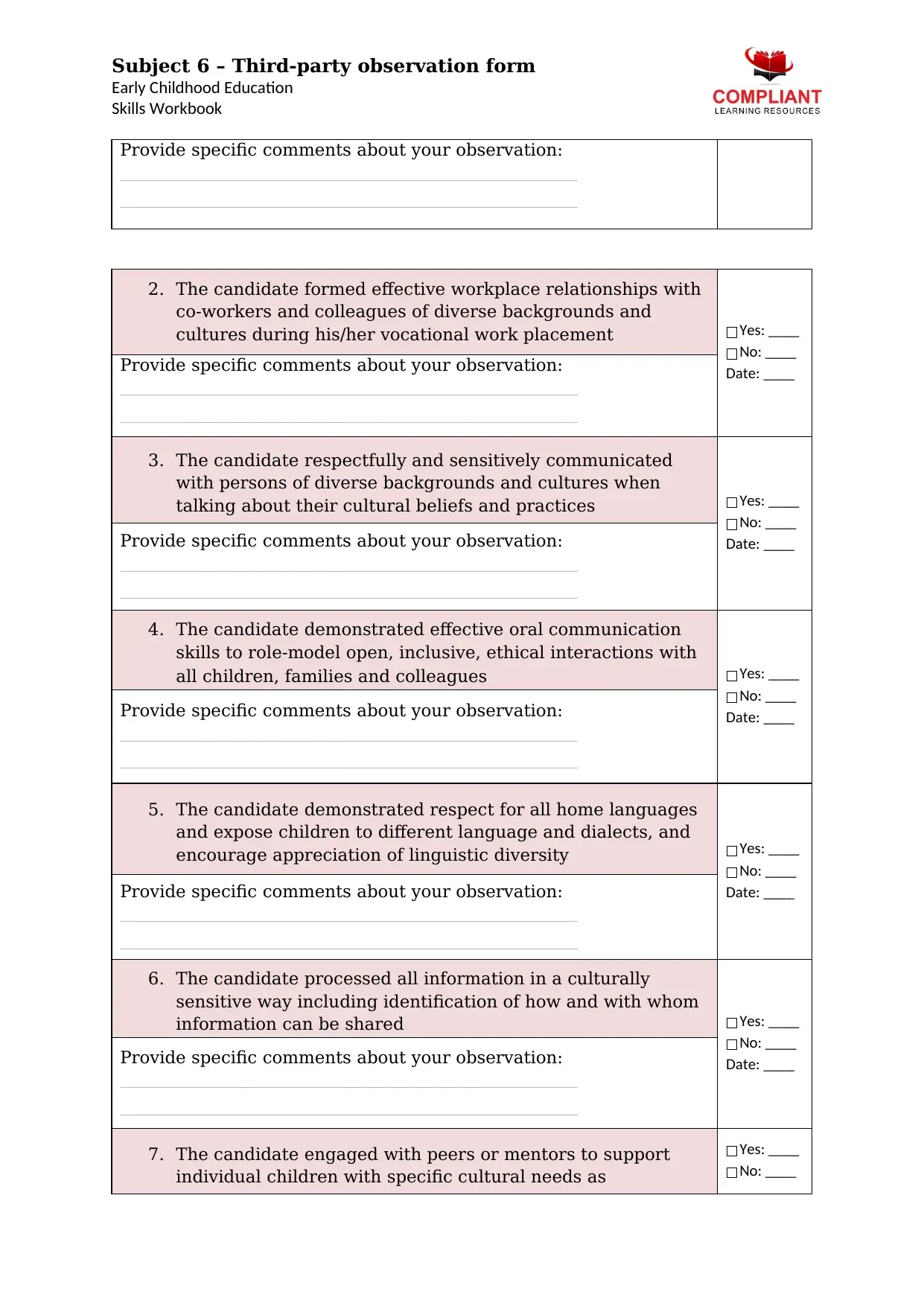
Subject 6 – Third-party observation form
Early Childhood Education
Skills Workbook
Provide specific comments about your observation:
___________________________________________________________
___________________________________________________________
2. The candidate formed effective workplace relationships with
co-workers and colleagues of diverse backgrounds and
cultures during his/her vocational work placement Yes: ____
No: ____
Date: ____
Provide specific comments about your observation:
___________________________________________________________
___________________________________________________________
3. The candidate respectfully and sensitively communicated
with persons of diverse backgrounds and cultures when
talking about their cultural beliefs and practices Yes: ____
No: ____
Date: ____Provide specific comments about your observation:
___________________________________________________________
___________________________________________________________
4. The candidate demonstrated effective oral communication
skills to role-model open, inclusive, ethical interactions with
all children, families and colleagues Yes: ____
No: ____
Date: ____Provide specific comments about your observation:
___________________________________________________________
___________________________________________________________
5. The candidate demonstrated respect for all home languages
and expose children to different language and dialects, and
encourage appreciation of linguistic diversity Yes: ____
No: ____
Date: ____Provide specific comments about your observation:
___________________________________________________________
___________________________________________________________
6. The candidate processed all information in a culturally
sensitive way including identification of how and with whom
information can be shared Yes: ____
No: ____
Date: ____Provide specific comments about your observation:
___________________________________________________________
___________________________________________________________
7. The candidate engaged with peers or mentors to support
individual children with specific cultural needs as
Yes: ____
No: ____
Early Childhood Education
Skills Workbook
Provide specific comments about your observation:
___________________________________________________________
___________________________________________________________
2. The candidate formed effective workplace relationships with
co-workers and colleagues of diverse backgrounds and
cultures during his/her vocational work placement Yes: ____
No: ____
Date: ____
Provide specific comments about your observation:
___________________________________________________________
___________________________________________________________
3. The candidate respectfully and sensitively communicated
with persons of diverse backgrounds and cultures when
talking about their cultural beliefs and practices Yes: ____
No: ____
Date: ____Provide specific comments about your observation:
___________________________________________________________
___________________________________________________________
4. The candidate demonstrated effective oral communication
skills to role-model open, inclusive, ethical interactions with
all children, families and colleagues Yes: ____
No: ____
Date: ____Provide specific comments about your observation:
___________________________________________________________
___________________________________________________________
5. The candidate demonstrated respect for all home languages
and expose children to different language and dialects, and
encourage appreciation of linguistic diversity Yes: ____
No: ____
Date: ____Provide specific comments about your observation:
___________________________________________________________
___________________________________________________________
6. The candidate processed all information in a culturally
sensitive way including identification of how and with whom
information can be shared Yes: ____
No: ____
Date: ____Provide specific comments about your observation:
___________________________________________________________
___________________________________________________________
7. The candidate engaged with peers or mentors to support
individual children with specific cultural needs as
Yes: ____
No: ____
⊘ This is a preview!⊘
Do you want full access?
Subscribe today to unlock all pages.

Trusted by 1+ million students worldwide
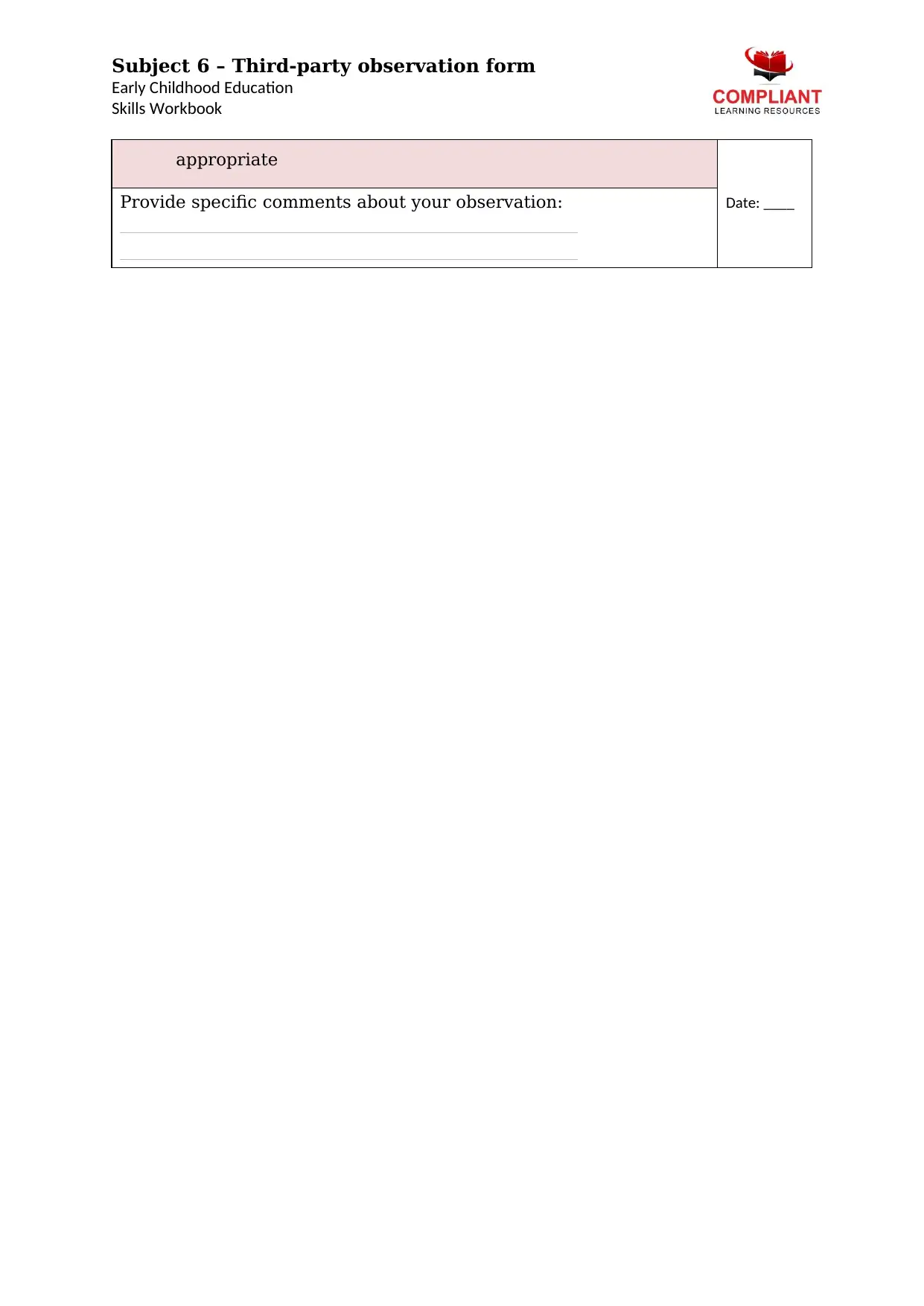
Subject 6 – Third-party observation form
Early Childhood Education
Skills Workbook
appropriate
Date: ____Provide specific comments about your observation:
___________________________________________________________
___________________________________________________________
Early Childhood Education
Skills Workbook
appropriate
Date: ____Provide specific comments about your observation:
___________________________________________________________
___________________________________________________________
Paraphrase This Document
Need a fresh take? Get an instant paraphrase of this document with our AI Paraphraser
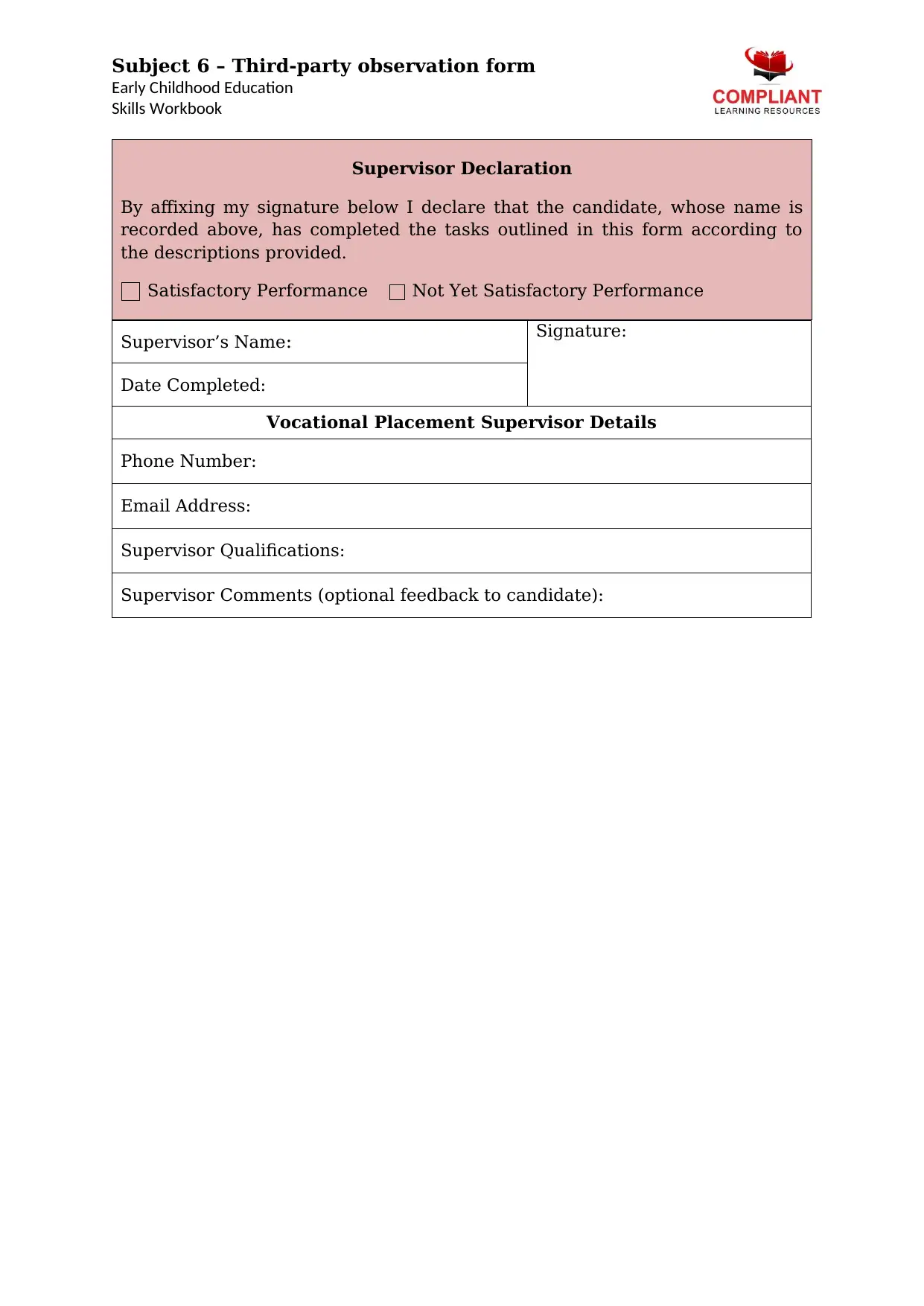
Subject 6 – Third-party observation form
Early Childhood Education
Skills Workbook
Supervisor Declaration
By affixing my signature below I declare that the candidate, whose name is
recorded above, has completed the tasks outlined in this form according to
the descriptions provided.
Satisfactory Performance Not Yet Satisfactory Performance
Supervisor’s Name: Signature:
Date Completed:
Vocational Placement Supervisor Details
Phone Number:
Email Address:
Supervisor Qualifications:
Supervisor Comments (optional feedback to candidate):
Early Childhood Education
Skills Workbook
Supervisor Declaration
By affixing my signature below I declare that the candidate, whose name is
recorded above, has completed the tasks outlined in this form according to
the descriptions provided.
Satisfactory Performance Not Yet Satisfactory Performance
Supervisor’s Name: Signature:
Date Completed:
Vocational Placement Supervisor Details
Phone Number:
Email Address:
Supervisor Qualifications:
Supervisor Comments (optional feedback to candidate):
1 out of 11
Related Documents
Your All-in-One AI-Powered Toolkit for Academic Success.
+13062052269
info@desklib.com
Available 24*7 on WhatsApp / Email
![[object Object]](/_next/static/media/star-bottom.7253800d.svg)
Unlock your academic potential
Copyright © 2020–2026 A2Z Services. All Rights Reserved. Developed and managed by ZUCOL.



